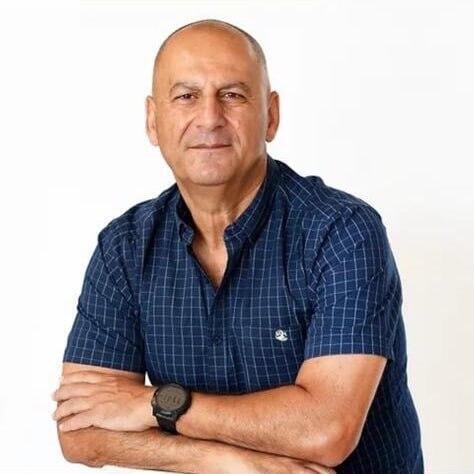Getting your Trinity Audio player ready...
Less than 24 hours after the High Court of Justice ruled on the pending dismissal of Shin Bet Director Ronen Bar, Prime Minister Benjamin Netanyahu summoned four candidates on Wednesday for interviews to potentially replace him. If the court ultimately allows the government to proceed with Bar’s removal, his successor is expected to be chosen from this group.
The first candidate is M., the current deputy head of the Shin Bet, whom Netanyahu previously appointed to lead the Israeli negotiating team on several overseas missions.
3 View gallery


Prime Minister Benjamin Netanyahu and outgoing Shin Bet Director Ronen Bar
(Photo: Yair Sagi, ABIR SULTAN/AFP, Shutterstock)
Also summoned were former deputy Shin Bet chief Yair (Ruli) Sagi, who had lost the race for the top post to Bar; Shalom Ben Hanan, a former division head and current security affairs commentator; and Eyal Tzir Cohen, a former senior Mossad official now serving as a researcher at the Institute for National Security Studies. Tzir Cohen is expected to meet with Netanyahu upon returning from an overseas trip.
Notably, Netanyahu appears to have ruled out interviewing S., the current deputy Shin Bet chief, who is widely considered a natural candidate for the role. Appointed only three months ago, S. is reportedly seen as lacking the necessary experience at this stage to assume leadership of the agency.
M.
Until recently, M. served as deputy director of the Shin Bet, a role he held for three years. His term was scheduled to end around the outbreak of the war, but at the request of both the Shin Bet chief and the prime minister, he extended his service until early this year.
A field operative by background, M. is an Arabic-speaking intelligence officer (“Arabist”) who wears a kippah and grew up in the religious Zionist community on a religious kibbutz. He is also a member of a bereaved family.
M. began his career in the Shin Bet as a field coordinator in the West Bank and steadily rose through the ranks to become head of the agency’s Judea, Samaria and Jerusalem division. Over the years, he held several key positions in counterterrorism before being appointed deputy chief.
His selection by Netanyahu to lead the Israeli delegation to hostage negotiations in Doha was welcomed within the Shin Bet. Current director Bar also supported M.’s appointment, allocating dedicated units and resources to assist him. Two senior Shin Bet officials joined him on the team: the head of foreign relations in the director’s office and the head of the agency’s department for hostages and missing persons.
Shalom Ben Hanan
Ben Hanan, 61, is a former senior Shin Bet official who headed the agency’s Israel and foreign affairs division as well as its training directorate. Over a 27-year career in the Shin Bet, Ben Hanan held numerous field and leadership positions, including field coordinator, district coordinator, desk branch chief, department head and director of both the Jerusalem and Judea divisions. He also served as chief of operations and head of training.
Following his retirement, Ben Hanan became a research fellow at the International Institute for Counter-Terrorism at Reichman University. In August 2023, Justice Minister Yariv Levin appointed him to the Drori Committee, the government panel tasked with investigating allegations surrounding the use of spyware by the Israel Police.
Eyal Tzir Cohen
A former division head in the Mossad, Tzir Cohen previously served in the Shin Bet and was part of the Israeli negotiating team during the early stages of the current war with Hamas. A graduate of the prestigious Wexner program, he has publicly criticized the handling of the hostage negotiations, arguing for a more assertive approach.
Coming from an operational background, Tzir Cohen is considered an “Arabist” and is known for his hawkish, offensive-minded security doctrine. His dual experience in both of Israel’s top intelligence agencies—Shin Bet and Mossad—is widely viewed as a significant advantage.
Tzir Cohen has been particularly vocal about what he sees as the strategic failures of the hostage deal’s first phase. On February 25, following the conclusion of that stage, he wrote: “The deal is being carried out while Hamas remains standing. The strategic implications of an agreement involving painful concessions cast doubt on our ability to sustain the war’s achievements—however significant—in the long run.”
Yair (Ruli) Sagi
A graduate of the Bnei Akiva yeshiva high school in Or Etzion, Sagi served as a combat soldier in the elite Sayeret Shaldag unit and held a number of senior roles in the Shin Bet, including deputy director and head of the strategic planning division responsible for organizational force-building.
As head of the Shin Bet’s southern division, Sagi oversaw operations during Operation Pillar of Defense in 2012 and led the agency again during Operation Protective Edge in 2014. His expertise in Gaza made him one of the strongest advocates for destroying Hamas’ offensive tunnel infrastructure. Known for challenging Military Intelligence assessments, he often interpreted intelligence from Gaza differently than the official line.
Sagi was the leading candidate for Shin Bet director under former Prime Minister Naftali Bennett, but political pressure from then-IDF Chief of Staff Aviv Kochavi, Defense Minister Benny Gantz and Military Intelligence head Aharon Haliva ultimately led to Bar's appointment instead.
A key advantage for Sagi is that he was no longer with the Shin Bet during the October 7 intelligence failure, distancing him from the fallout. In addition to his operational and intelligence credentials, he is a trained engineer, formerly served as deputy head of the Shin Bet's technology division, and holds a master’s degree in public administration.
While awaiting a decision on the Shin Bet post during Bennett’s tenure, he joined the Defense Ministry’s R&D directorate (MAFAT) to assist in developing advanced weapons systems. In 2023, he founded several tech companies focused on cybersecurity and drones, and now advises dual-use technology startups.
The court's ruling
The High Court on Tuesday rejected a petition by Attorney General Gali Baharav-Miara seeking to prevent Netanyahu from interviewing candidates for the position of Shin Bet chief.
Shortly after the ruling, the prime minister’s spokesperson, Dr. Omer Dostri, announced: “Following the High Court’s dismissal of the attorney general’s attempt to block the start of the appointment process for a new Shin Bet director, the prime minister will begin interviewing candidates tomorrow.”
<< Get the Ynetnews app on your smartphone: Google Play: https://bit.ly/4eJ37pE | Apple App Store: https://bit.ly/3ZL7iNv >>
However, the court ruled that the temporary injunction freezing the appointment process “shall remain in effect until a further decision is made”—contrary to Netanyahu’s request to lift it. Earlier in the day, the prime minister had formally asked the court to cancel the freeze on the selection process.
In its latest submission to the court, the government for the first time explicitly acknowledged that “the current head of the Shin Bet will remain in his position until the court issues a further decision.”
The government also argued there was “no justification to prevent the initiation and advancement of the process to replace the head of the Shin Bet.”
It warned that if the attorney general’s position were accepted, and the petition later dismissed, “the current director would end his term without a permanent successor, necessitating the appointment of an acting chief and prolonging the instability currently affecting the Shin Bet due to the government’s suspended decision to terminate his tenure.”




